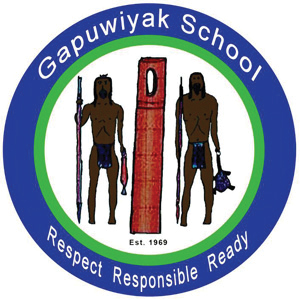Gapuwiyak
Name of School
Gapuwiyak School
Name of Ranger Group
Yirralka Rangers
What languages do you mainly speak in your community?
Djambarpuyngu and English
How many people live in your community?
Approximately 800
When did the Learning on Country Program start in your community?
October (Term 4) 2019
What does the Learning on Country Program mean to your community?
It’s a chance for the community to be part of the children’s education. The community has a say in developing activities that are meaningful for both ways learning.
Why is it important?
It is an important program because it is increasing the capacity of Yolngu future leaders within the community and encourages children to come to school.
What type of LoC activities happen at your community?
- Weekly cultural activities for many classes
- LoC as part of the curriculum for years 7 & 8
- Years 9 -12 involved in VET training (Conservation & Ecosystem Management)
- Galtha Rom (Yolngu University) events
- Funeral support (pop up schools, recording of ceremony, logistical support)
- Cultural days within the school
- LoC is part of all school camps
- Biodiversity surveys
- Working with Rangers, TOs and Teachers.
Tell us about the Rangers supporting the LoC Program. What lessons are they teaching the students about your country?
Rangers have worked with senior students teaching them about the djarma (work) that rangers do. Such as weed identification and their control and management, fire work, animal trapping and camera surveys as part of biodiversity monitoring, looking after significant cultural sites, how to look after country – both ways (modern science and traditional way), Gurrutu – family connections to country – who the country belongs to and who is responsible for looking after it.
What future training or work opportunities are available in your community for LoC students?
The LoC is more than a Ranger program. Our LoC Program is aiming to make children feel good about themselves through maintaining their identity, knowing who they are and their place in the world.
VET training in Conservation and Ecosystem Management will continue to be a component in our LoC program. Although specific to Ranger training this course is tailored to focus on preparing students for and giving them work ready skills and attributes.
There is hope for some ranger traineeships for senior students to be available in the near future.
What other LoC Partnerships are happening in your community?
LoC collaborates with most stakeholders within the community and region such as:
- East Arnhem Regional Council
- Miwatj Health Service
- Arnhem Land Progress Association
- Gong-Dal Aboriginal Corporation
- Milindji Aboriginal Corporation
- Yirralka Rangers
LoC has also been successful in acquiring funds from ALPA’s East Arnhem Land Youth Model program to run a series of walks on country (Walking on Country) for disengaged school children and youth. These walks incorporate cultural knowledge from Elders, Cultural Custodians and rangers.
What is something you are most proud of about LoC in your community?
LoC is helping bring the community back to the school. Yolngu team teachers are becoming fully engaged through ownership of content being taught within the school.





